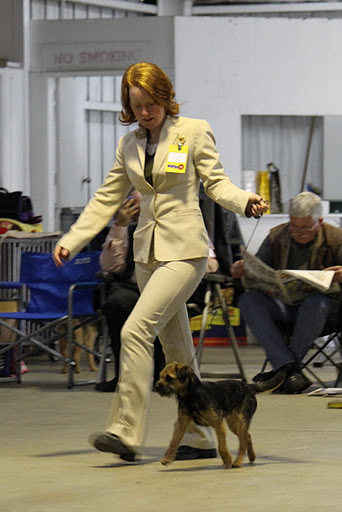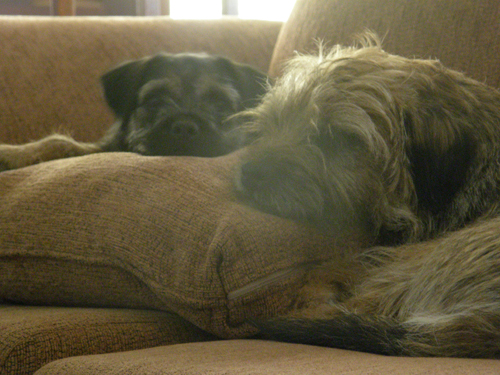Reviewing 2011; Goals for 2012
I celebrated New Years Eve at a twilight dog show, with my three adult dogs: Clover, Chip, and Winnie. It was lovely, and really encapsulates that doggy year that I have had.
This post is quite personal in comparison to my regular content, but I hope it may still be of interest to my readers. I’ve broken this post up into different doggy-interests, and described 2011 happenings and 2012 goals in each.

Winona at the Border Terrier Club of NSW’s Championship Show in 2011. At this show, Winona was given Best Puppy in Show and also awarded Best Head. Go Winnie!
Conformation
I have been focusing my showing efforts on Winona, and she has accumulated approximately 70 points over the last year. I have hopes that she will collect her remaining 30 points next year and so gain her champion title. She has also had the most success, gaining several baby puppy in groups, puppy in groups, and a runner up in group along the way. Her mum and dad, Clover and Chip, have been shown sparingly, but Chip has still been awarded points over the year gone. Clover… Clover had fun.
Earthdog
In South Australia, unfortunately, we have had some problems with our Earthdog judges, which meant that I was one of only two judges in the state. This is problematic as passes at each level must be awarded by at least two judges and, as I can’t judge my own dogs, it made it difficult to gain titles on my dogs.
Chip, however, had passes from 2010, and so got his “Senior Earthdog” title early in the earthdog season. He then went on to receive three “Master Earthdog” passes, but he needs one more under a different judge to get his ME title. Unfortunately, he is likely to be leaving us before the next earthdog season, and so it seems unlikely that he will gain his ME title.
Clover is in a similar boat, also having three “Master Earthdog” passes. However, next year, she’ll still be here to compete and so should gain her ME title easily. We then intend to pursue her “Master Earthdog Excellence” title, which involves a further five passes in senior and an additional five passes at master. It will be tight for us to achieve this in our short earthdog season, but I hope we may be able to!
And darling Winona… At 6 months, I took an innocent puppy to earthdog practice, and found myself coming home with a dogged rabbit hunter! At 6 months and one day, Winona gained her first pass for her “Novice Earthdog” title. However, she was not entered in anymore tests for the season. Hopefully we will be able to achieve her NE and her SE titles in 2012. (But “Senior Earthdog” does involve a recall and this is not a forte of my independent Winona.) Continue reading




